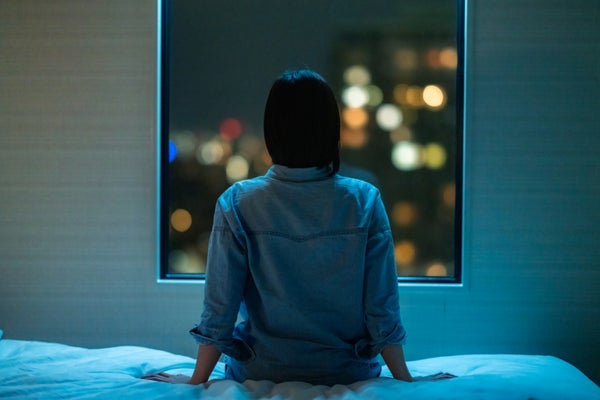In 1818 Johann Christian August Heinroth, considered to have been the first professor of psychiatry at a university, suggested that sleep deprivation might alleviate “melancholia,” or depression. But it wasn’t until 1959 that formal reports began to emerge, again from Germany, suggesting that a night of sleeplessness could boost mood in depression. Experimental trials in the 1970s went on to confirm a benefit. Since then study after study has shown that spending a night without sleep, especially with lights on, indeed produces mood benefits for about half of the people with depression.
The effects of this approach, dubbed “wake therapy,” offer the bonus of being immediate, unlike most antidepressants, which require a few weeks to work. Sleep deprivation has disadvantages that include, well, going without sleep. As anyone who has parented an infant can attest, that has unwanted “spillover” effects on other aspects of life. Identifying processes in the brain that underlie sleep-deprived boosting of mood could lead to therapies that are less burdensome than enduring a wakeful night.
A new study published June 20 in the Proceedings of the National Academy of Sciences USA has identified specific brain regions that kick up activity when sleep deprivation lifts one’s mood. Because the research included people with and without depression, the findings broaden understanding about the “bizarre phenomenon” of mood-boosting sleep deprivation, says study author Philip Gehrman, a professor of clinical psychology at the University of Pennsylvania.
Even without immediately leading to new therapies, the results confirm the benefit of wake therapy in depression, says Anna Wirz-Justice, a professor emerita at the Center for Chronobiology at the University Psychiatric Clinics Basel in Switzerland, who was not involved in the work. “Perhaps this study, which provides clues to mechanisms, will lead to reevaluation of the intervention as an inexpensive, rapid antidepressant modality.”
To take a peek inside the brain, Gehrman and his colleagues evaluated 30 people with major depressive disorder who all underwent sleep deprivation. They also assessed another 54 people without depression, 16 of whom served as controls who did not undergo sleep deprivation.
Over the course of five days, researchers performed three imaging scans on all of the participants. The sleep deprivation groups underwent one scan after a normal night’s sleep, another after a sleepless night and a third after two nights of recovery sleep. The 16 control participants without depression underwent three scans, too, but got regular sleep. The scanning tracked blood oxygen delivery in the brains of participants as they lay still, doing nothing. In between scans, every two waking hours from days two to five, all participants completed a questionnaire assessing their mood.
The questionnaire responses showed that 43 percent of those with diagnosed depression experienced mood improvement after sleep deprivation. Most, but not all, of those without depression reported a worsened mood after losing sleep.
Imaging in those reporting improved mood showed increased activity in two brain regions that were previously implicated in depression and the effects of sleep deprivation. One of these regions, the amygdala, is famously associated with emotion processing and memory. The other is the anterior cingulate cortex, which studies have connected to depression and to the benefits of sleep deprivation. Unexpectedly, activity in these two areas was increased in participants whose mood improved whether they had depression or not.
The involvement of the anterior cingulate cortex “fits the picture” that these previous studies have pieced together about depression and disrupted sleep, says Francesco Benedetti, a longtime sleep disruption researcher at the department of clinical neurosciences at San Raffaele Hospital in Milan, who was not involved in the work.
The implied link between the two regions suggests that they have a role in producing an elevated mood after a sleepless night. In participants with depression, the connection persisted even after two nights of recovery sleep. Benedetti says that sleep deprivation may heighten the effect of structures in the upper part of the brain, such as the anterior cingulate cortex, on quieting the amygdala and boosting mood. This signal in people reporting mood improvement regardless of depression diagnosis is “an important clue” to understanding how sleep deprivation works, Wirz-Justice says. Studies like this are a “fabulous” way to study what underlies changes in mood without interference from medications, she adds.
Back in 1976 Burkhard Pflug, a psychiatrist at the University of Tubingen in Germany, wrote that sleep deprivation might behave like a “zeitgeber,” or “time giver,” in people with depression and resynchronize aberrant brain rhythms. Benedetti’s work indicates that depression might flatten rhythmic cycles that support brain function and that sleep deprivation might jump-start these rhythms back into a healthy pattern.
The new findings may offer targets for reviving the zeitgeber in depression in accessible ways. A noninvasive technique called transcranial magnetic stimulation, in which magnetic waves are applied from outside the skull, is used to treat depression, but its effectiveness relies on hitting the right regions. Gehrman says that brain circuits that are responsive to sleep deprivation could represent candidate targets for transcranial magnetic stimulation or other kinds of stimulation. Such approaches hold potential to produce the rapid effect of sleep deprivation without the downside of a sleepless night.
